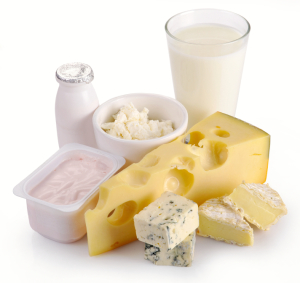Nutrition – Second Stop: Dairy
 When I was growing up, I heard, ‘Drink all of your milk. It will make your bones & teeth strong,’ and ‘So and so is very healthy, he or she is milk-fed.’ Now we hear that dairy is actually bad for our bodies, what is up with that?
When I was growing up, I heard, ‘Drink all of your milk. It will make your bones & teeth strong,’ and ‘So and so is very healthy, he or she is milk-fed.’ Now we hear that dairy is actually bad for our bodies, what is up with that?
Why are a significant number of people allergic or sensitive to dairy? Research has shown there are enzymes that we are born with that help digest milk and by the ages of 2 or 5 years old, these enzymes are no longer available to help digest the protein (casein) or sugar (lactose) in dairy products.
What is casein? Casein is a protein that is found in milk and used independently in many foods as a binding agent. It takes a long time for the body to digest and can be problematic for some people to assimilate.
What is lactose? Lactose is a natural sugar found in dairy that 75% of people are unable to digest dairy and this is known as lactose intolerance.
How do you know if you have issues with dairy? If you are allergic, the evidence is typically immediate and obvious such as; hives, wheezing or vomiting. If you have sensitivities to lactose and/or casein, the symptoms (or the cause) may be less obvious. For lactose sensitivity, the symptoms range from nausea, diarrhea, bloating, flatulence, Irritable Bowel Syndrome to malabsorption, which is a nutrient deficiency like anaemia, or bone density loss to mood swings, depression. A casein sensitivity exhibits symptoms such as itchy skin, eczema, coughing or sinusitis.
In addition, recent research has linked dairy to weight gain, migraines, prostate cancer, breast cancer, diabetes, high cholesterol, and heart disease. For many, dairy could be totally fine, but for some, it is problematic.
If you find yourself or you someone you love having issues with digesting dairy, the best thing to do is to go dairy free. Below are a few alternatives to common dairy products.
|
Food Category |
Good |
Better |
Best |
| Milk | Rice Milk | Coconut Milk | Almond Milk |
| Butter | Kerry Gold Butter | Earth Balance non-soy | Olive Oil or Ghee |
| Cheese | Raw Cheeses | Tofutti Cream Cheese | Daiya Cheese |
| Yogurt | Greek Yogurt | Coconut Milk Yogurt | Nogurt Yogurt |
| Ice Cream | Gelato | Rice Milk such as Rice Dream | Coconut Milk such as Purely Decadent |
Remember, this is a process. Going dairy free if you have an allergy must be done and done quickly. However, if you are going dairy free due to curiosity, take your time, experiment with products and alternatives and take notice of how you feel. I suspect you will feel better – lighter and less congested, but experiment and let us know. We are interested in your results.


Definitely feeling better without the dairy products. I would add that dairy most likely adds to the weight gain because small amounts of products like cheeses or creams have disproportionately high calories compared with vegetables or fruits or grains. A bagel with cream cheese, cheese on the hamburger at lunch, extra cheese on pasta at the restaurant, or a small cheesecake all have huge amounts of calories. The cravings can be satisfied with fruit and other healthier alternatives you already mentioned above. Here’s an interesting test (I thoroughly enjoyed discovery of this one). Go to a restaurant and see how many menu items have no dairy of any kind. It’s everywhere and in everything in most places. The body then must become a factory of huge throughput – consume large amounts of calories then somehow burn those (time at the gym, running, etc.) else store for future consumption through fat… Thanks again. Great article.
I was amazed when I discovered all of the other sources of calcium besides dairy. When I was growing up, strong bones and teeth were the direct result of ‘drinking all of your milk’. However, salmon, molasses, broccoli and other leafy green vegetables are all excellent sources of calcium. I think we will continue to be amazed as more and more studies are done on how much our bodies really only want healthy foods.